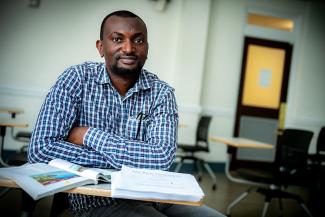Taofeeq Adebayo’s idea was so simple, and yet the opportunity it afforded would benefit thousands of schoolchildren. Middle-school science students in Nigeria had to study from English-language textbooks, when English was not their native tongue. So he translated one for them.
Adebayo (SLA ’19) is a Mellon Fellow in the School of Liberal Arts, where he is pursuing a PhD in linguistics.
Actually, Adebayo’s idea may have been simple, but the process was more complex. The translation of Longman’s Basic Science 1 from English into Yoruba took years to develop and test, and the publication schedule was interrupted by the pandemic. The textbook will likely be published by next year, but early feedback looks promising.
“One of the interesting things that we found was that the students [who were taught using the translated textbook] were more excited to participate in class,” Adebayo said. “It became possible for them to ask probing questions, questions that let you know what was going on in their mind.” In some cases students were better able to consider scientific properties and principles in relation to the world around them, or even in relation to the folk science that they had heard.
Adebayo, who worked with a team of Yoruba-speaking university students on the translation, traveled to Nigeria multiple times to work with the teachers who would be teaching from the textbook. Statistical analyses followed. And then so did COVID-19.
But the pandemic helped turn his mission into a multimedia operation. While travel was shut down in 2020, Adebayo and his colleagues began to create and post science videos to a Facebook group called Science in Yoruba, which now has more than 23,000 followers.
“The idea is to make it as simple as possible for people who do not have any formal education in the Western way, [to] also have access to this knowledge,” said Adebayo, who taught himself how to make a video.
Social media, Adebayo added, has been a benefit to the initiative while the textbook is being prepared. He sees international interest from followers of the Facebook group, proving that accessible scientific knowledge is in demand worldwide.
“Moving forward, I hope that we will see more engagements, even beyond the shores of Nigeria.”































































